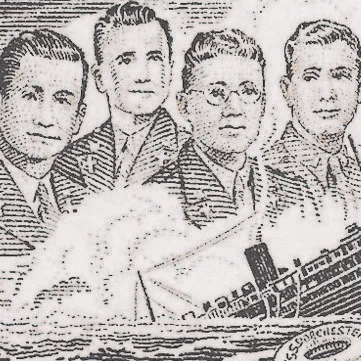The Four Chaplains
February 3, 1943 - On this day four men of different faiths gave their lives so that others might live.
The men were aboard the USAT Dorchester, a troop transport bound for Greenland during World War II. There was a Methodist Reverend named George L. Fox, a Rabbi named Alexander D. Goode, a Reformed Church in America Reverend named Clark V. Poling, and a Catholic Priest named John P. Washington.
On the evening of February 3rd, a German U-boat (U-223) fired a torpedo into the Dorchester's hull. The blast crippled the ship's power, making it impossible to even send a distress call to the other ships in its convoy. The Dorchester would be underwater in 20 minutes.
With half the ship's lifeboats inoperable due to a severe list, and massive overcrowding on the remaining boats, the scene was on the brink of total chaos. But there were voices of reason. The four chaplains spread out into the crowd and tried to calm the men. They organized their groups and distributed life jackets. When the supply ran out, they gave up the ones they were wearing to the next four men in line.
Since there was not enough room in the lifeboats, the only chance of survival was a leap into the freezing water (34° Fahrenheit). As men hit the water, they were quickly paralyzed by the cold.
Hundreds drowned as hypothermia took its toll, but many managed to survive. One man, Private William Bednar recalled the terrible scene:
I could hear men crying, pleading, praying. I could also hear the chaplains preaching courage. Their voices were the only thing that kept me going.
Witnesses saw the four chaplains with arms linked and braced against the slanted deck as the ship went down. There were 902 men aboard the Dorchester and 672 died that night, including the four chaplains. But 230 men survived and were rescued by the Coast Guard Cutters Escanaba and Comanche.
Each of the four chaplains received the Distinguished Service Cross and Purple Heart posthumously. A special Medal for Heroism was also awarded by President Eisenhower.




